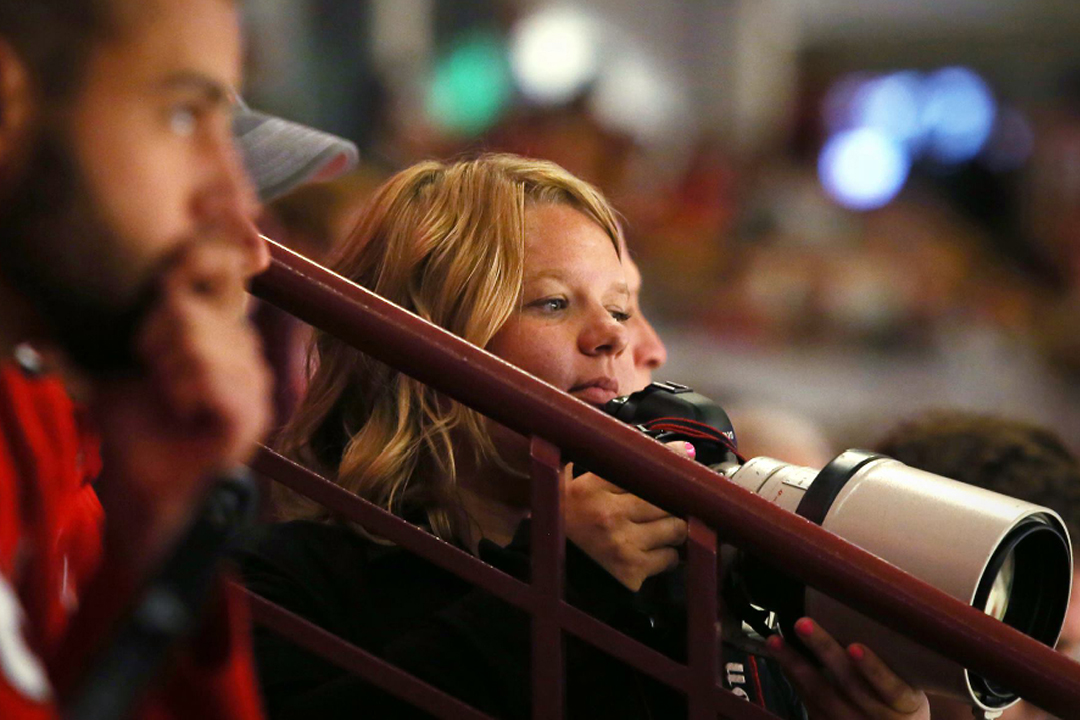As a photojournalism student at the Corcoran more than a decade ago, Jessica Koscielniak read the writing on the wall: The journalism industry was headed in a more digital direction.
“Something was telling me that if I was going to do journalism, I needed to have some multimedia skills,” says Koscielniak, who graduated in 2007.
She enrolled in a digital media class at the time but sought work as a photographer after graduating. Fast forward 10 years and Koscielniak is an award-winning multimedia journalist based in Washington, D.C.
She was recently recognized for her work on a video profile of a Mississippi alligator hunter and his quest for the “Moby Dick” of gators. “King of the Swamp” won first place in the multimedia sports category of the of the White House News Photographers Association’s 2016 “Eyes of History” contest.
“Quite frankly it was the hardest assignment I've ever done,” says Koscielniak, whose journey to multimedia journalist brought her to northwest Indiana, Miami, Haiti, India, California, Chicago and eventually back to D.C. It crystalized while she was working at the Chicago Sun Times in 2013, the year the paper infamously laid off its photo staff, and Koscielniak stayed on as a full-time video journalist.
A Passion for Storytelling
Despite the somewhat compulsory transition to multimedia, Koscielniak has embraced her second act in journalism.
“When I interviewed at McClatchy, my boss said to me, ‘How do you feel about not being a photojournalist?’ and I said, ‘I’ll always be a photojournalist, but video and multimedia is just a different way of storytelling,’” Koscielniak says. “In the end I find it easier to tell stories with audio and video, and I think you come out with well-rounded narratives. I actually feel more fulfilled doing multimedia and doing video.”
That passion is evident in the way she describes her work, including the time she spent working on "King of the Swamp"—a project that stemmed from Kosceilniak's fascination with Mississippi alligator hunting.
"Alligator hunting in Mississippi is very different than alligator hunting in a place like Louisiana or New Orleans," she says. "In New Orleans, they put chicken on a stick and they leave it there for hours. ... In Mississippi, they actually use rods and reels and hooks."
After some initial research, Koscielniak found Scott Barry, the owner of two Mississippi state alligator records, a dream of a southern accent and a mission to find a monster alligator. "I just knew when I had him on the phone that this was the guy," says Koscielniak, who spent 10 days with Barry hunting for the mythical alligator. "We would leave around 4 in the afternoon; we'd drive about two hours, and we would hunt from about 6 p.m. till about 7 or 8 in the morning in an 18-foot, single motor boat."
While the experience was physically and mentally grueling and Barry ultimately came up short of cinching another state record, the story is both the hardest and coolest assignment Koscielniak says she's ever worked on.
Corcoran Community and Beyond
Koscielniak credits her time at the Corcoran for helping her become a well-rounded journalist.
“The Corcoran, specifically Susan Sterner, was such a gift to me starting out because she taught me how not just to think about pictures and captions but to look at the big picture of the stories you want to tell and the philosophy behind the way you want to tell them,” Koscielniak says. “She really drove home what it means to be a good journalist."
Koscielniak encourages current and future Corcoran students to take advantage of the talent and resources available at the school, but to also tap into the resources that D.C. has to offer.
"If you come to the Corcoran, there are so many resources—there’s so much talent at the Corcoran—but there’s so much talent in D.C.,” she says. “The classroom is not just the four walls where you go to school—it’s the whole city.”
One of Koscielniak’s fondest memories is the support she and fellow Corcoran students received from local, well-known industry photographers during the opening of their graduating class’s senior thesis exhibition.
“The community support of photojournalists and video journalists and multimedia journalists in D.C. is unlike anywhere else in the country,” she says. “That’s something that just doesn’t happen anywhere else.”


